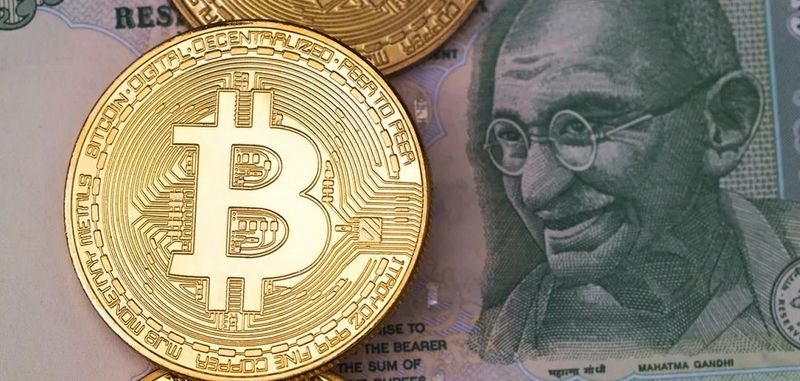Why India's lifting of crypto ban is the biggest positive factor in 2020
Source / LongHash

Last week, India's Supreme Court officially lifted a comprehensive ban imposed by the country's central bank, the Reserve Bank of India (RBI), in April 2018, and allowed it to be carried out in India for the first time in practical terms in almost two years. Crypto transactions.

- Where will the safe-haven funds go after Black Monday?
- Telegram says recent ruling "fundamentally" overturns SEC ban
- Dialogue | Where is the Blockchain in the New Infrastructure?
From the relatively stable price of Bitcoin, it can be seen that the crypto market did not respond much to this important landmark event. However, the lifting of this ban is likely to be a long-term catalyst for the crypto industry in the coming years.
How does the ban affect local crypto companies?
First, let's review the background of the event. It all started on April 5, 2018. At that time, the RBI unexpectedly issued a ban to Indian commercial banks, prohibiting financial institutions in the country from doing business with crypto-related companies, including crypto exchanges.
Two years ago, the RBI claimed:
"The Reserve Bank has repeatedly warned users, holders and traders of virtual currencies (including bitcoin) that they face various risks when dealing with such virtual currencies. Taking into account the related risks, the Reserve Bank of India has decided that any No regulated entity should establish business relationships with any individual or corporate entity that trades or clears virtual currency, or provides services to these individuals or entities, with the decision to take effect immediately. The regulated entity that is currently providing such services should do so within the required time Termination of business relationship. The Bank will officially issue a notification document in this regard. "
The RBI decision immediately became a major obstacle for local crypto exchanges. The country's head exchange can no longer handle deposits and withdrawals with users' bank accounts. Users cannot transfer Indian rupees from a bank account to an exchange, so they cannot invest in cryptocurrencies.

Just four months after the Reserve Bank of India (RBI) issued an injunction, Zebpay, India's largest cryptocurrency exchange at the time, had no choice but to leave. However, they have returned to the Indian market again since then.
The Zebpay team has stated that maintaining operations without the support of local banks is almost impossible.
The team spoke in September 2018:
"For hundreds of thousands of Indians, Zebpay's app is their first step into the bitcoin world … but the time just passed is a very difficult time. Limitations on bank accounts Has severely paralyzed … the business … we couldn't find a reasonable way to launch a crypto exchange business. "
Time is moving forward, and other popular Indian crypto exchanges have also closed down. By mid-2019, Koinex, Cryptokart and Coinome have all terminated their businesses.
For example, prior to the RBI's trading ban, Koinex's trading volume rose strongly, reaching $ 265 million in December 2017. Rahul Raj, co-founder of the exchange, sees more than just banks refusing to support crypto-related companies. The exchange has encountered difficulties in paying employees salaries, purchasing equipment, receiving services from suppliers, and obtaining financial services from payment gateways.
Simply put, the ban issued by RBI in 2018 blocked almost all the financial channels and services that a crypto company depends on.
Why did India lift the ban on crypto trading after 1 year and 10 months?
After 22 months of hard work, India's leading cryptocurrency exchanges Unocoin, WazirX and Pocketbits, with the help of the Indian Internet and Mobile Association (IAMAI), a non-profit organization within the industry, The ban argues with the RBI.
It can be said that the courtsaw sawing ups and downs after several years. Until mid-2019, the Supreme Court seemed to be leaning in favor of RBI decisions.
In July 2019, an interagency cryptocurrency research committee formed by the Indian government proposed a ban on crypto assets. The leader of the committee, Indian Minister of Finance Subhash Chandra Garg, has proposed a bill entitled "Cryptocurrency Ban & Official Digital Currency Regulation Act", against institutions such as IAMAI, which competes with RBI in crypto cases before the Supreme Court. Additional pressure was applied again.
An article published on the University of Oxford Business Law Blog described the commission's proposal to ban cryptocurrencies as India's "missing opportunity" by Shehnaz Ahmed, a senior researcher at Vidhi's Legal Policy Center.
However, the overall sentiment surrounding the crypto market has changed since the second half of 2019, when the Financial Action Task Force (FATF) of the G7 countries' regulators called on all member states to adopt uniform guidelines for cryptocurrencies.

In February 2020, the G20 formally recommended that countries implement the FATF crypto asset standard. The communiqué issued by the G20 Group makes it difficult for major countries to simply abandon cryptocurrencies as before, as the global community is moving towards adopting cryptocurrencies and the guidelines provided by FATF. The communique reads:
"Based on the 2019 Leadership Declaration, we urge countries to implement the recently adopted FATF standard for virtual assets and related providers. We reiterate here again the so-called" global stablecoin "and similar programs issued in October 2019 Statement that such risks must be assessed and appropriately addressed. "
The general attitudes of key countries and regions such as the United States, Japan, South Korea, and Hong Kong to crypto assets, and the choice of other countries and regions to regulate cryptocurrencies rather than completely negate the asset class may affect the Indian government and make them rethink the ban Cryptocurrency trading practices.
WazirX CEO believes new ruling will drive mass adoption of cryptocurrency in India
WazirX CEO Nischal Shetty said in an exclusive interview with LongHash that the resumption of cryptocurrency trading has historical significance for India's entire crypto ecosystem.
"Today is a historic day for the entire crypto ecosystem in India," Shetty said. "The positive ruling of the Supreme Court will open the door to the large-scale adoption of cryptocurrencies in India. It proves that we can now innovate and that the entire country can participate in the blockchain revolution."
Shetty emphasized that the decision will welcome the country to more local innovative companies, capital and a booming cryptocurrency industry, adding:
"Local companies can now innovate and invest in crypto without having to worry about bank bans. They will have access to banking channels. They can also use many fintech products that were previously inaccessible due to bank bans, such as automated KYC systems, etc."
Shetty pointed out that in the long run, the global digital currency community will begin to benefit from the lifting of the ban.
"India has a population of over 1 billion and is a sleeping giant. I believe this ruling will have a positive impact on the global crypto ecosystem. The Indian Supreme Court has ruled that the RBI ban on banks from providing services to crypto startups is unconstitutional. We should We will see a surge in cryptocurrency startups in India, which will bring thousands of new jobs and millions of dollars of new venture capital to India ’s cryptocurrency space. "
With Binance as a pioneer, industry executives expect more foreign companies to do business in India over time. Since the last quarter of 2019, Binance has invested in Indian blockchain projects and companies such as WazirX.

Over the past two years, regulatory uncertainty regarding cryptocurrencies and crypto exchanges has prevented head companies from expanding into India. Through the establishment of foreign customer support or the establishment of regional exchanges, exchanges such as Coinbase, Binance, Huobi, and OKEx have expanded to overseas markets such as South Korea. However, due to India's crypto trading ban, major exchanges have not previously targeted the Indian market.
In the short term, at least from the price trends of the past three days, macro events, such as the legalization of cryptocurrencies by the South Korean government and the lifting of India's crypto trading ban, may have very little impact on the price of Bitcoin.
However, in the long run, foreign cryptocurrency-related companies have entered India, and more than one billion people have adopted cryptocurrency in major markets. The change in the perception of cryptocurrencies by global laws will undoubtedly change the cryptocurrency industry.
So why hasn't the price of Bitcoin been affected? Quite simply, maybe this is just because the outbreak of the new crown virus in Europe, Asia, and the United States temporarily suppressed this long-term catalyst that can promote crypto growth. But the story is far from over.
LongHash , read the blockchain with data.
We will continue to update Blocking; if you have any questions or suggestions, please contact us!
Was this article helpful?
93 out of 132 found this helpful
Related articles
- Japanese financial regulator launches global blockchain governance initiative network
- Perspectives | Three Important Ways for Blockchain Development
- See the inflection point of the world with the crude oil plunge and Bitcoin plunge
- Babbitt Column | Does Blockchain Native Asset Really Make Sense?
- Is your digital asset protected on the exchange? Understanding the gap between exchanges and traditional banks
- The 500 billion yuan evaporated in January, and the production-reduction coins collapsed across the board. The "minsky moment" of the crypto market came?
- Bitcoin mining difficulty has risen sharply, or the price of coins has picked up






